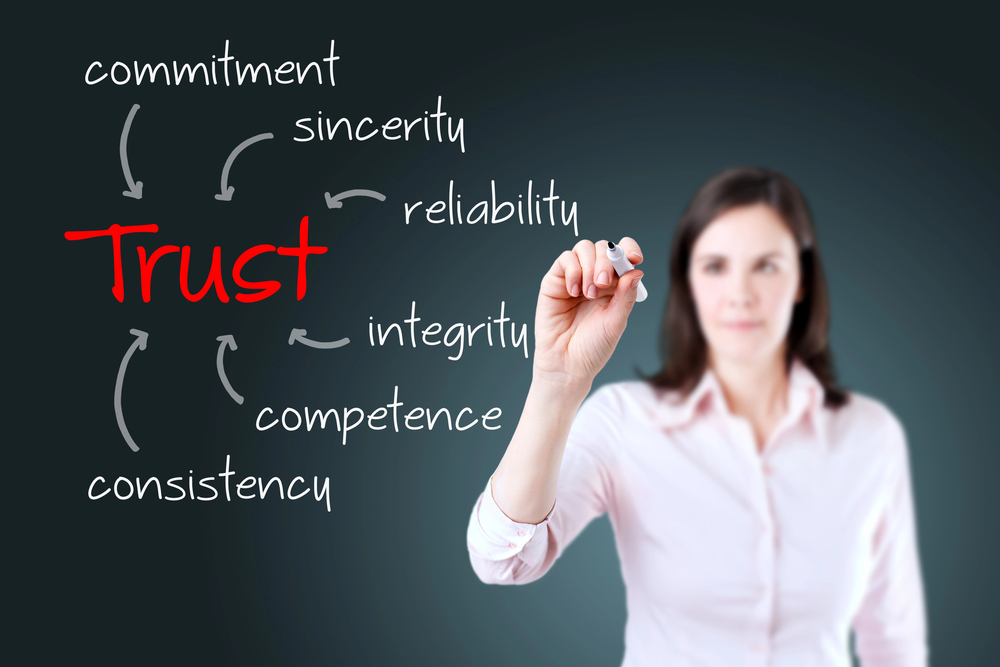Rebuilding Trust In A Relationship: A Guide To Restoring Love
 Trust is the glue that holds relationships together, but everything can feel unstable when it shatters. This blog post provides critical insights from a top couple's therapist on mending these cracks. Our guide offers clear steps and heartfelt advice to heal your relationship and weave trust back into its fabric. Discover how to start rebuilding […]
Trust is the glue that holds relationships together, but everything can feel unstable when it shatters. This blog post provides critical insights from a top couple's therapist on mending these cracks. Our guide offers clear steps and heartfelt advice to heal your relationship and weave trust back into its fabric. Discover how to start rebuilding […]Trust is the glue that holds relationships together, but everything can feel unstable when it shatters. This blog post provides critical insights from a top couple's therapist on mending these cracks.
Our guide offers clear steps and heartfelt advice to heal your relationship and weave trust back into its fabric. Discover how to start rebuilding today—read on for hope and healing.
Understanding Trust in a Relationship
 Moving beyond introductions, let's delve into what trust means in a relationship. It acts like the glue that holds partners together, forming a foundation for love to grow and thrive.
Moving beyond introductions, let's delve into what trust means in a relationship. It acts like the glue that holds partners together, forming a foundation for love to grow and thrive.
When you put your faith in someone, you believe they will honor their commitment to you and stand by their words. It's about feeling secure enough to share your deepest thoughts without fear of judgment or betrayal.
Trust doesn't appear overnight; it develops gradually as couples consistently show reliability, loyalty, and fidelity. This steady build-up of confidence makes both individuals feel at ease and gives them the assurance they need to invest emotionally in one another.
Maintaining a deep connection becomes much more challenging without this sense of security and mutual belief in each other's intentions.
Signs of a Lack of Trust in a Relationship
Recognizing a trust deficit is crucial, as it often manifests in subtle behaviors undermining the partnership. Whether through secret-keeping or controlling tendencies, these actions signal a deeper issue waiting to be addressed.
Keeping Secrets
Keeping secrets can erode the very foundation a relationship is built on—trust. When partners hide information or feelings, it creates doubt and fear.
These hidden truths can fester over time, leading to a gap in communication and an increase in emotional distance. Instead of sharing openly, individuals might withhold details about their lives, which hurts the partner and slowly dismantles the intimacy that holds the relationship together.
Openness and honesty are critical for maintaining a healthy connection between two people. A partner who discovers deception may feel betrayed and question every aspect of their relationship.
To prevent such outcomes, both must commit to transparency as a key pillar in their journey together. This means setting aside fears of judgment or confrontation and embracing vulnerability with one another—a crucial step before addressing controlling behaviors that often pair with trust issues.
Controlling Behavior
Controlling behavior in a relationship can feel like a tight grip on your freedom. A partner may dictate who you talk to, where you go, and even what you wear, signaling deep insecurity and distrust.
This overbearing conduct often masks their fears by exerting power over someone else's life choices.
It erodes the very foundation of trust that healthy relationships are built upon. Instead of mutual respect, there's a one-sided attempt to micromanage every move. Partners trapped in this cycle might find themselves walking on eggshells, anxious about setting off another round of possessive or paranoid responses from their significant other.
Addressing these patterns is crucial to reviving the love and trust that once thrived between two people.
Ways to Rebuild Trust in a Relationship
 Rebuilding trust in a relationship takes time and dedication from both partners. It's about finding common ground, actively listening to each other's concerns, and making a concerted effort to address the underlying issues that led to broken trust.
Rebuilding trust in a relationship takes time and dedication from both partners. It's about finding common ground, actively listening to each other's concerns, and making a concerted effort to address the underlying issues that led to broken trust.
Reconnecting Through Communication
Effective communication acts as the bridge that connects two hearts after trust has faltered. Talk openly. Have thoughtful dialogues addressing wounds, needs, and hopes. Empathize first rather than attacking. Even if it is difficult, keep engaging with courage and care.
Listen fully before responding: Don't just mentally prepare rebuttals while your partner shares vulnerable emotions. Receive the words deeply before offering your perspective.
Connect consistently: Set aside regular and spontaneous times for heartfelt check-ins. Put devices away, make eye contact, and give your partner your full presence.
Grow together: Do a relationship workbook, take a workshop, read insightful books, and seek counseling if needed. Examine patterns mindfully, gain understanding, and adopt healthier relating habits.
Create intimacy: Ask meaningful questions, speak your truth tidily, offer sincere praise, and express affection and gratitude. Reveal your inner self bit by bit; respond sensitively when your partner unveils theirs.
Healing Past Wounds
As we hone in on communication, we unearth the importance of healing past wounds for trust restoration. Tackling these emotional scars is crucial to securing your partner's attachment.
Name old pains: Verbalize how previous experiences of betrayal, abandonment, rejection, or abuse broke trust in relationships and your worthiness of love.
Let go gently: Let old relational wounds heal by releasing harmful habits like scorekeeping, blame, and vengeance. Stop self-sabotaging due to fear of repeating past hurts.
Forgive yourself and others: Make peace internally and externally with those involved in inflicting former damage as you feel capable. This lifts heavy burdens from your spirit.
Trust your intuition now: Stay fully present rather than viewing current relationships through filters of past dysfunctions. Your inner guidance will lead you well if you heed its wisdom.
Does inner child work? Comfort the parts of you that endured childhood emotional needs going unmet with nurturing words and new experiences that rebuild self-confidence and security.
Make daily nourishing yourself physically and emotionally with healthy foods, relaxing activities, positive affirmations, and other soul-soothing rituals a priority.
Rebuilding Emotional Intimacy
 Healing past wounds sets the stage for the delicate task of rebuilding emotional intimacy. This process is vital in repairing trust and nurturing a deeper connection between partners.
Healing past wounds sets the stage for the delicate task of rebuilding emotional intimacy. This process is vital in repairing trust and nurturing a deeper connection between partners.
- Open up slowly: Begin letting down walls and sharing more vulnerability, but pace yourselves. Move step by step into deeper intimacy only as both feel genuinely comfortable.
- Listen more than speak: Create space for both partners to feel heard, seen, and valued rather than just taking turns talking. Gift each other with your full presence.
- Empathize first: Seek your partner's inner world before stating your perspective. Imagine walking in their shoes. Express compassion.
- Ask thoughtful questions: Inquire with sensitivity, care, and genuine interest to foster mutual understanding of inner lives.
- Name feelings: Labeling emotions accurately builds literacy and fluency around processing complex feelings together.
- Validate freely: Verbalize appreciation for each other's gifts, victories, efforts, and emotional availability. Offer encouragement and positive feedback.
Rekindling the Spark
 Having rebuilt emotional intimacy, it's time to ignite a new flame in your relationship. Rekindling the spark revives love and strengthens your bond.
Having rebuilt emotional intimacy, it's time to ignite a new flame in your relationship. Rekindling the spark revives love and strengthens your bond.
- Alter routines: Shake up habitual ruts-try new restaurants, vacation spots, and classes together. Experiencing novel settings side by side summons excitement.
- Explore passions: Engage each other's hobbies with genuine curiosity. Ask questions, share progress, and admire talents. Passions set spirits alight.
- Text flirtatiously: Initiate inside jokes and teasing banter via text to build anticipation for being together. Playful words spark dopamine hits.
- Initiate affection: From hugs and kisses leaving for work to cuddling on the couch, display physical affection consistently rather than waiting for your partner to make the first move. A warm touch rekindles connections.
- Give loving gazes: Hold eye contact, savoring simply being with each other without talking. Read one another's eyes; recognize the beautiful soul shining through.
- Date deliberately: Plan regular creative date nights, moonlit picnics, couples art classes, hot air balloon rides, and concerts. Relish new adventures together. The couple who plays together stays together!
Letting Go and Moving Forward
After reigniting the flame with rekindled sparks, focusing on the path ahead is crucial. Letting go of past hurts and embracing the future is pivotal in restoring trust.
Release the past. Stop rehashing old hurts once amends have been made. Allow former betrayals and disappointments to dissolve as you choose optimism and possibility moving ahead.
- Give your all now: Judge current relationship efforts and intimacy on their own merits, not through filters of previous pain projected onto the present. Stay grounded today.
- Extend grace freely: We all fall short sometimes or have moments of weakness. Offer each other patience and compassion rather than keeping score.
- Focus on solutions: Rather than stewing over what went wrong before, have constructive conversations about how to prevent future pitfalls through better communication, boundary-setting, and teamwork.
- Let patterns go: Just because distrust happened once doesn't mean history must repeat itself. Make the conscious choice to relate differently, breaking negative cycles binding you to past ways of thinking, feeling, and behaving with each other.
- Walk hopefully: Rebuilding trust requires risk and vulnerability. But you determine the direction ahead step by step. Move forward courageously, keeping your eyes fixed on the bright future emerging.
Nurturing the Relationship Daily
Nurturing the relationship daily is integral to rebuilding trust. It requires consistent effort and a genuine commitment to growth and forgiveness.
- Give focused attention: Set aside daily distraction-free time together - even just 20 minutes of enjoying a cup of tea before bed. Soak up this space to reconnect without multitasking.
- Offer small acts of kindness: Surprise your partner with their favorite snack or coffee drink when least expected. Fill their car with gas. Bring home a book you think they'd enjoy. Tiny gestures signal you hold them in mind and care about their needs.
- Share encouraging texts: Send periodic little notes of affection and motivation throughout busy days to stay connected. Quick "I appreciate you" and" thinking of you" texts bolster bonds in between together time.
- Savor intimate contact: Greet each other with welcoming hugs and kisses coming and going. Snuggle on the couch watching movies. Cuddle before sleeping. Affection releases bonding hormones essential for trust.
- Speak each other's love languages: Find out whether your partner feels most cherished through physical touch, acts of service, gifts, words of affirmation, and quality time. Then, intentionally engage those on a daily.
Seeking Professional Help

Sometimes, rebuilding trust in a relationship requires more than just the efforts of those involved. A trained therapist or counselor can help mend the broken bonds. Professional help, such as couples therapy, provides a space where both partners can speak openly and honestly without fear of judgment.
It offers tools that foster better communication skills and trust-building.
Counselors bring a neutral and unbiased outside perspective, often revealing underlying issues not immediately apparent to the couple. They guide you through healing past wounds while supporting your journey toward a stronger connection.
With their expertise, couples receive personalized strategies for improving their relationship dynamics, ensuring every step taken moves toward mutual understanding and renewed trust.
Therapy can also help individuals uncover their contributions to trust issues, whether past experiences affecting current behavior or personal insecurities manifesting in the relationship. This self-awareness is crucial for personal growth and the relationship's overall health.
By understanding and addressing these personal factors, partners can work together more effectively to rebuild a foundation of trust and mutual respect.
Celebrating Small Victories
Celebrating small victories is a critical step in rebuilding trust. It's about taking a moment to acknowledge the effort both partners are putting into repairing their bond. Whether it's successfully navigating a difficult conversation without conflict or managing a day without doubts surfacing, these milestones matter.
They build an emotional connection and reinforce the trust that's slowly healing.
Make time to recognize each other's efforts and mark achievements, no matter how minor they may seem. These moments encourage progress and remind both partners why they're working hard to strengthen their relationship.
These small victories contribute to a positive cycle of reinforcement. As trust rebuilds, partners feel more motivated to continue their efforts, creating a stronger, more resilient relationship.
Celebrating these achievements strengthens the bond and helps build a shared history of overcoming challenges, reinforcing the commitment to each other and the relationship's future.
Sowing Seeds of Trust: Growing a Stronger Bond
Recognizing and addressing issues like secrecy, controlling behavior, and nurturing emotional intimacy and mutual respect are crucial. Daily nurturing, celebrating small victories, and seeking professional help when needed are all part of this complex but rewarding journey.
Ultimately, rebuilding trust is a transformative process that involves healing past wounds and actively cultivating a future filled with hope, understanding, and deepened connection. This guide serves as a roadmap, encouraging couples to embark on this path with courage, patience, and a persistent commitment to each other.

